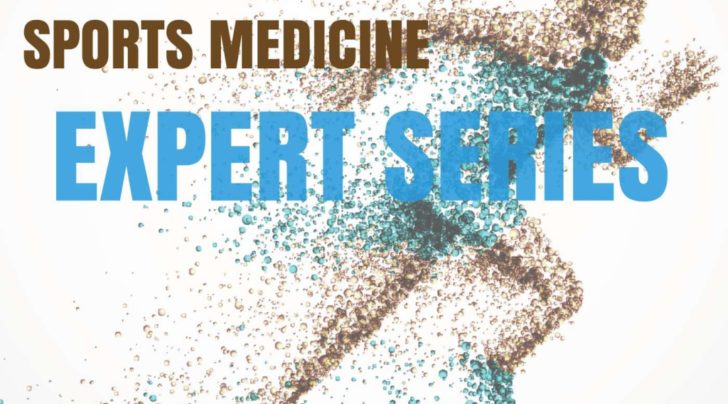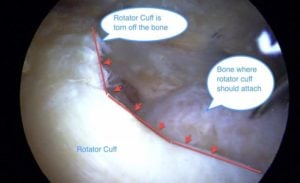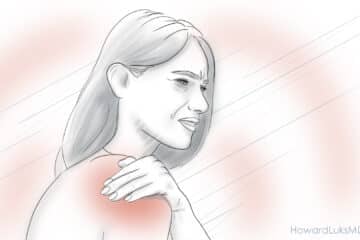
The rotator cuff is composed of 4 very important muscles. Together they surround your shoulder and help you move the arm. Rotator cuff injuries can cause pain, loss of motion and weakness. Tears of the rotator cuff are very common. That’s because many rotator cuff tears are due to degeneration — like an old pair of blue jeans. The older you are, the more common rotator cuff injuries are. Why is that? What is the cause of rotator cuff tears? In this post we have 5 Orthopedic Surgeons who are considered experts in their field. We will focus on the cause of rotator cuff tears. Our other expert posts cover the treatment of rotator cuff tears.
More than 40% of patients over 60 will have a rotator cuff tear and not even know it
Most people with shoulder pain who are found to have a rotator cuff tear on an MRI do not recall a single, isolated traumatic event. They may have felt a pop when moving their shoulder, but they didn’t fall or get into an accident. When we find a tear in this scenario the cause of the rotator cuff tear is usually “degenerative tendinosis”. Tendinosis is a condition when your rotator cuff tissue simply wore out. Like you favorite pair of blue jeans … or that sock you just poked your toe through. Trauma is another cause of rotator cuff tears, but traumatic tears are far less common then degenerative tears. We are starting to identify techniques to possibly cure tendinosis which could hopefully decrease the risk of having a rotator cuff tear.
Does it matter what the cause of your rotator cuff tear is?
Determining the cause of your rotator cuff tear is very important, because that will influence what treatment is most appropriate for you.
Today we continue with our Expert Series where 4 Orthopedic Surgery experts in the area of shoulder surgery will start off answering a number of questions about the rotator cuff.
Our first post by our experts will focus on the cause of rotator cuff tears, and rotator cuff “disease” or tendinosis.
Scott Slattery, MD: Website, Twitter
The rotator cuff is a group of four muscles and tendons that closely surround the shoulder joint. Rotator cuff tears are very common. Most rotator cuff tears are caused by gradual wear of the tendon material as we age. The area has poor blood supply and is subject to a lot of load and surface wear. Anything that affects the blood supply and tissue quality, like smoking, can make tears more likely. Sudden trauma and strain can speed up this process, and cause sudden complete tears. It’s like wearing a hole in your jeans. Over time the material gradually thins and wears, creating a hole. Sudden strain on the fabric can make it tear more rapidly.
Marty Leland, MD: Website, Twitter, Facebook
What are the leading causes of rotator cuff /disease/tears? As with many musculoskeletal problems, rotator cuff disease can either stem from 1 major injury or as a slow, degenerative process. The acute injuries that can lead to rotator cuff tears include rapid twisting motions of the shoulder (such as in a fight) or shoulder dislocations in patients over age 40. Trying to lift up a heavy object, such as a full briefcase, with the arm completely extended out in front of them, can also cause rotator cuff tears. Other tears are slow and degenerative in their development. These patients do not remember any marked injury to their shoulder, just that it gradually started hurting and became weak.
Jeffery Berg, MD: Website, Twitter
The two leading causes of RC issues are attrition (wear and tear over time) and acute injuries. Attritional issues are more common. These occur as a result of accumulative damage over time (every day use, mild injuries) that is greater than the bodies healing potential. This type of “injury” results in the rotator cuff getting progressively more damaged with time. As a result, these issues are more common in older patients since there is an increased amount of time for damage to accumulate and the healing potential of the tissue is reduced. Acute traumatic tears are less common but usually more symptomatic. These result from an abrupt failure of the tendon, typically at its insertion onto the upper arm, but also occasionally within the tendon substance as well.
Derek Ochiai, MD: Website, Twitter
Rotator cuff issues are very common ailments. The causes (in general) relate to the patient’s age and activity level. In younger patients under the age of 30, the cause can be a violent, traumatic force to the arm/shoulder, tearing the rotator cuff tendons away from the bone. In overhead athletes, such as baseball pitchers or tennis players, the cause may be internal impingement, where the cartilage of the joint rubs abnormally on the rotator cuff. In older individuals, the onset is usually more insidious. While a complete rotator cuff tear may occur, the trauma is usually more mild (such as picking up a heavy suitcase). This is because the tendon is already undergoing degeneration, and typically the patient has some pre-existing (though mild) rotator cuff symptoms.
You can see that a consensus opinion exists. The most common cause of rotator cuff tears is degeneration of your rotator cuff tissue. It’s an unfortunate consequence of genetics, aging and our cumulative activities. Trauma can also cause the rotator cuff to tear. As we will explore in future posts, the cause of your tear will matter when we discuss treatment strategies with you.














Can you tell me in layman what this is? I had an MRI on my left shoulder although having pain in both shoulders. I can see something about a Rotor Cuff Tear. Thanks
Impression:
1. Distal supraspinatus tendinopathy with a suspected small
chronic articular surface partial tear just proximal to its
insertion. Distal/insertional infraspinatus tendinopathy with an
irregular partial tear at its insertion.
2. Moderate to advanced osteoarthritic changes in the
glenohumeral joint with involvement of the labrum and likely
associated tears in the latter as described.
3. Moderate degenerative changes in the AC joint, along with a
curved acromion process there is mass effect upon the
supraspinatus myotendinous junction and tendon respectively.
This is one of the downsides of getting MRI reports before having a chance to review them with the doc who ordered them :-).
First thing to remember… no one over 20 has an MRI that says “normal”
Second… many changes on MRIs are normal and age related … even small rotator cuff tears, and certainly labral tears.
Third… It takes a good doc who can take your history (story about the onset of pain), your physical examination, and the MRI reports to tell you which of the changes might be the source of your pain.
In LAYMAN’s terms … :-)
1- Age related mild degeneration of your rotator cuff attachment. Rarely needs surgery
2- You have severe osteoarthritis – loss of cartilage in the shoulder joint.– Probable cause of your pain. Ignore the labral tears… the labrum, a cartilage cushion that often becomes worn away from use, age, and the arthritis.
3- Furthermore, there is arthritis in a joint that sits above the shoulder. We call that the AC joint. Everyone over a certain age has arthritic changes in this joint. Sometimes it is the source of pain, but it is not very common.
So… If your shoulder is bothering you a lot you should visit with an Orthopedic Doctor who specializes in shoulders. Hopefully he/she will help you determine which is the source of your pain and offer you a proper treatment plan.
Good Luck.